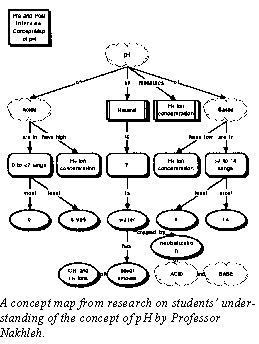
Send E-mail : chemed@chemed.chem.purdue.edu

Purdue University houses one of the few groups studying the factors that
affect how students learn chemistry and how best to teach chemistry. Faculty
members in our Division of Chemical Education are Professors George M. Bodner, Mary B. Nakhleh, and William R. Robinson. These faculty and graduate students in the division
do basic research on questions such as:
Our graduate program in chemical education is designed to meet the needs
of students with a broad range of backgrounds and interests. Among the students
who have enrolled in our program are individuals interested in a career
at the college or university level, either in chemistry or science education;
graduate students who find that they prefer teaching at the high-school
or two-year college level to a career in chemical research; and high-school
teachers who want to update their training in chemistry or enter careers
in teaching training. For some of these students, a Ph.D. is necessary;
for others, a M.S. degree is sufficient.
The chemical education faculty will be happy to work with you to develop
a plan of study for an M.S. or Ph.D. degree that best meets your individual
needs.

To date, more than 40 students have earned M.S. degrees from the Division
of Chemical Education at Purdue. Some of them have completed a thesis under
the supervision of a faculty member in chemical education. Others pursued
a non-thesis option, which allowed them to take additional courses that
led to certification to teach chemistry at the high-school level.
The M.S. degree is awarded on completion of a program within the Department of Chemistry that requires a minimum of 20 hours of graduate-level course work. At least 12 of these credit hours must be in chemistry. Because our students take courses in both Chemistry and Education, they often finish with one or two courses beyond the required 20 hours.
In addition to courses from the traditional areas of chemistry, students
working toward an M.S. in chemical education take at least two courses from
among the following: educational psychology, survey of science education,
measurement and evaluation, multi-cultural education, educational technology,
qualitative research, and methods of teaching chemistry.
Some students in chemical education obtain certification to teach high-school
chemistry at the same time as their M.S. degree. Requirements for certification
include an additional 28 hours of professional education courses including
a 10-week period of student teaching. Some of these students also complete
an M.S. thesis, but many choose a non-thesis option.
The Ph.D. is a research degree awarded to those who demonstrate their ability
to make original contributions to knowledge in a field. Research in chemical
education requires a combination of talents. In addition to their chemistry
background, students in this area may also require a strong background in
cognitive psychology, statistical or qualitative research methods, testing
and measurement, computer science, or curriculum theory.
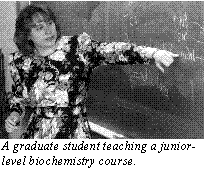 There are different routes to a Ph.D. in chemical education at Purdue.
Students can earn a Ph.D. from the Department of Chemistry with a thesis
in chemical education, or they can receive their Ph.D. from the Department
of Curriculum and Instruction in the School of Education.
There are different routes to a Ph.D. in chemical education at Purdue.
Students can earn a Ph.D. from the Department of Chemistry with a thesis
in chemical education, or they can receive their Ph.D. from the Department
of Curriculum and Instruction in the School of Education.
Students in the Chemistry Department's Ph. D. program with a thesis in chemical
education often select one of the five traditional areas of chemistry (analytical,
biochemistry, inorganic, organic, or physical chemistry) as an area of content
specialization. They take enough course work in that area to pass the cumulative
exams in the area, a minimum of 9 credit hours in an area outside of their
area of content specialization, and enough courses in education to write
and defend an original proposal that describes the research they wish to
do for their Ph.D.
Students with research interests that are directed towards education, but
also include chemistry, can work towards a Ph.D. in Science Education with
one of the faculty in chemical education as their research director. Those
interested in computers in chemical education can earn a Ph.D. in the Educational
Computing and Instructional Design (ECID) program. Ph. D. work in either
of these programs requires a strong background in chemistry. As a result,
all candidates for these Ph.D. degrees from the Department of Curriculum
and Instruction must have an M.S. in Chemistry.
Several of our students who received Ph.D.'s in Science Education are employed
as Directors of General Chemistry at large, research-oriented universities.
However, students interested in teaching chemistry at a level beyond general
chemistry at four-year colleges and universities are generally advised to
complete their Ph.D. in Chemistry.
SUMMARY OF PROGRAMS
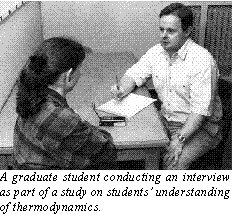
*A more detailed description of the requirements for these degrees are outlined in the Handbook for Graduate Students in Chemistry at Purdue University which is available from the Department of Chemistry, 1393 Brown, Purdue University, West Lafayette, IN 47907.
Students admitted to the M.S. and Ph.D. programs in Chemistry are supported
as teaching assistants during their first year and are guaranteed support
for 3 years (M.S.) or 5 years (Ph.D.) -- provided they are making satisfactory
progress towards their degree. Ph. D. candidates in Science Education or
Educational Computing are supported during the academic year by research
grants or as teaching assistants in either Chemistry or the Department of
Curriculum and Instruction.
RECENT PUBLICATIONS FROM THE DIVISION OF CHEMICAL EDUCATION
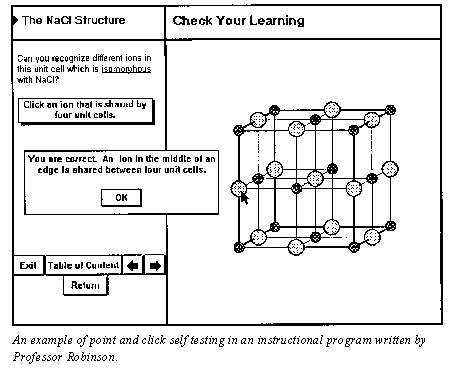
Various chemistry textbooks have been published by members of the Division
of Chemical Education, including:
General Chemistry, 10th Ed., by W. R. Robinson, J. D. Odom, and H. E. Holtzclaw, Jr., Houghton
Mifflin, 1997.
Chemistry: Concepts and Models, W. R. Robinson. J. D. Odom, and H. F. Holtzclaw, Jr., D.C. Heath and Co.,
Lexington, 1992.
Chemistry: An Experimental Science, 2nd Ed., by G. M. Bodner and H. L. Pardue, John Wiley and Sons, August,
1994.
Chemistry: Structure and Dynamics, Preliminary Edition, by G. M. Bodner, L. H. Rickard, and J. N. Spencer,
John Wiley and Sons, August, 1995.
Representative publications by members of the Division include:
G. M. Bodner, P. E. Smith, K. L. Keyes, and T. J. Greenbowe, The Purdue Lecture Demonstration Handbook, John Wiley and Sons, August, 1994.
G. M. Bodner, I Have Found You An Argument: The Conceptual Knowledge of Beginning Chemistry Graduate Students, J. Chem. Ed., 68, 385-388 (1991).
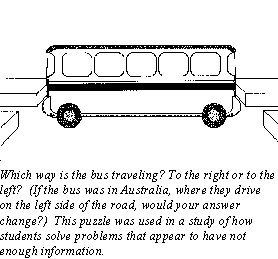
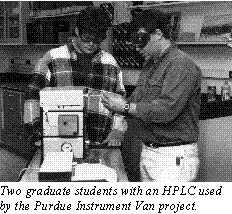 C. W. Bowen and G. M. Bodner, Problem-Solving Processes Used by Graduate
Students While Solving Tasks in Organic Synthesis, Internat. J. Sci. Education, 13, 143-158 (1991).
C. W. Bowen and G. M. Bodner, Problem-Solving Processes Used by Graduate
Students While Solving Tasks in Organic Synthesis, Internat. J. Sci. Education, 13, 143-158 (1991).
G. M. Bodner, The Forum: Refocusing the General Chemistry Curriculum, Why
Changing the Curriculum May Not Be Enough, J. Chem. Ed., 69, 186-190 (1992).
N. W. Brickhouse and G. M. Bodner, The Beginning Science Teacher: Narratives
of Convictions and Constraints, J. Res. Sci. Teaching, 29, 471-485 (1992).
G. M. Bodner and D. S. Domin, The Role of Representations in Problem Solving
in Chemistry, in Toward a Cognitive-Science Perspective for Scientific Problem Solving: A
Monograph of the National Association for Research in Science Teaching ,
Number 6, p.245-263 (1995).
W. R. Robinson and M. Niaz, Performance Based on Instruction by Lecture
or by Interaction and Its Relationship to Cognitive Variables, Internat. J. Sci. Education, 13, 203-215 (1991).
M. Niaz and W. R. Robinson, Manipulation of Logical Structure of Chemistry
Problems and Its Effect on Student Performance, J. Res. Sci. Teaching, 29, 211-226 (1992).
W. R. Robinson and M. H. Townes, Student Use of Test Wiseness Strategies in Solving Multiple-Choice General
Chemistry Examinations, J. Res. Sci. Teaching, 30, 709-722 (1993).
S.C. Nurrenbern and W. R. Robinson, Unexpected Aspects of Quantitative Research, J. Chem. Ed., 71, 181-183 (1994)
W. R. Robinson, A Window on the Solid State, Part I. Structures of Metals
and Part II. Unit Cells of Metals;. J. Chem. Ed.-Software, April, 1994.
M. B. Nakhleh, Are Our Students Conceptual Thinkers or Algorithmic Problem
Solvers? Identifying Conceptual Students in General Chemistry, J. Chem. Ed., 70, 52-55 (1993).
M. B. Nakhleh and R. C. Mitchell, Concept Learning versus Problem Solving:
There Is a Difference, J. Chem. Ed., 70, 190-192 (1993).
M. B. Nakhleh and J. S. Krajcik, A Protocol Analysis of the Effect of Technology
on Students' Actions, Verbal Commentary, and Thought Processes During the
Performance of Acid-Base Titrations, J. Res. Sci. Teaching, 30, 1149-1168 (1993).
M. B. Nakhleh, Students' Models of Matter in the Context of Acid-Base Chemistry, J. Chem. Ed., 71, 495-499 (1994).
M. B. Nakhleh and J. S. Krajcik, Influence of Levels of Information as Presented by Different Technologies on Students' Understanding of Acid, Base, and pH Concepts, J. Res. Sci. Teaching, 31, 1077-1096 (1994).
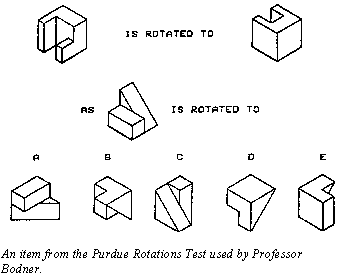
Send E-mail : chemed@chemed.chem.purdue.edu
This counter was reset on 3/27/97